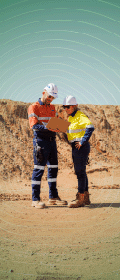 Recently DRA Group CEO, Paul Thomson and ELB Group CEO, Stephen Meijers, announced The ARDBEL Joint Venture, a collaboration between the two organisations to combine the best of breed skills in terms of large-scale projects and materials handling. In what represents a landmark development in the sector both parties are of the opinion that this marks the creation of a business that will not only redefine large scale materials handling in Africa but could, in due course, become a major African-based global player.Meijers said that the joint venture, in which both parties have an equal shareholding, “enables ELB to extend their current capabilities and offerings into large-scale materials handling projects by leveraging DRA’s credentials together with their own.” Thomson stated that “this collaboration enables DRA to be able to extend its offering along the mining value chain thus furthering its goal to be able to engineer and operate ‘pit to port’ engineering solutions that offers an attractive benefit to new mine developers in Africa.”
Recently DRA Group CEO, Paul Thomson and ELB Group CEO, Stephen Meijers, announced The ARDBEL Joint Venture, a collaboration between the two organisations to combine the best of breed skills in terms of large-scale projects and materials handling. In what represents a landmark development in the sector both parties are of the opinion that this marks the creation of a business that will not only redefine large scale materials handling in Africa but could, in due course, become a major African-based global player.Meijers said that the joint venture, in which both parties have an equal shareholding, “enables ELB to extend their current capabilities and offerings into large-scale materials handling projects by leveraging DRA’s credentials together with their own.” Thomson stated that “this collaboration enables DRA to be able to extend its offering along the mining value chain thus furthering its goal to be able to engineer and operate ‘pit to port’ engineering solutions that offers an attractive benefit to new mine developers in Africa.”
With its huge infrastructural development programme and massive mineral resources, the large-scale materials handling requirements of Africa are substantial and growing exponentially. Given an extensive combined African footprint consisting of over 20 countries. ELB and DRA are extremely positive regarding the potential growth that the collaboration offers in terms of further extending their ‘home market’ into Africa.
The picture shows a current DRA project, Glencore’s Tweefontein coal processing plant, currently under construction in Mpumalanga South Africa. It is rated at 13.6 Mt/y ROM, 2,200 t/h (nominal 2,000t/h + 10% design allowance) whilst the crushing plant is rated at 2,400 t/h. The four-stage crushing plant is designed to handle reclaimed pillared coal as well as normal mined coal, whilst the process plant uses standard Witbank coal processing technology in a double stage wash configuration using 1,150mm via DM cyclones and spirals. The cyclone plant can be run as a single stage washing plant if for instance, a lower primary product quality is required. The slimes are pumped to an adjacent slimes dam where they’ll be stored and could be recovered in future for beneficiation and recovery. Products are stockpiled on a 600,000t capacity stacker/underground reclaim stockpile and will be fed to a rail load-out bin at a rate of 5,000t/h. Product qualities of 5,800–5,900 kcal/kg (export) and 21.5–22 MJ/kg are targeted outputs.









